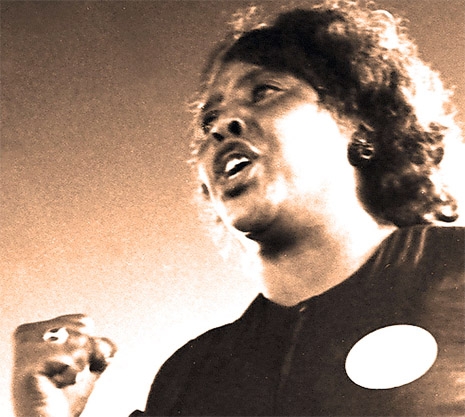
Fannie Lou Hamer – Singing Loud
Credit: dangerousminds.net
“Sometimes it seems like to tell the truth today is to run the risk of being killed. But if I fall, I’ll fall five feet four inches forward in the fight for freedom. I’m not backing off.” — Fannie Lou Hamer
Last night the sea was roaring, and the waves were swelling. It seemed like the storm outside my window was a metaphysical reflection of the level of grief and riots happening at present. United in voice, women’s funds across the US, and the globe, endorsed the statement issued by members of the Women’s Funding Network:
In the week since four police killed George Floyd in Minneapolis, there has been a collective call not only for justice, but also for philanthropy to resource systemic change by supporting organizations that are taking real steps to end the undeniable racism and injustice baked into our society that defines Black lives as expendable.
As women’s funds, foundations, and gender justice funders we cannot erase the image of Mr. Floyd calling for his mother. We understand that the outcomes of state violence are woven deeply into Black women’s experience. There is no gender justice without racial justice.
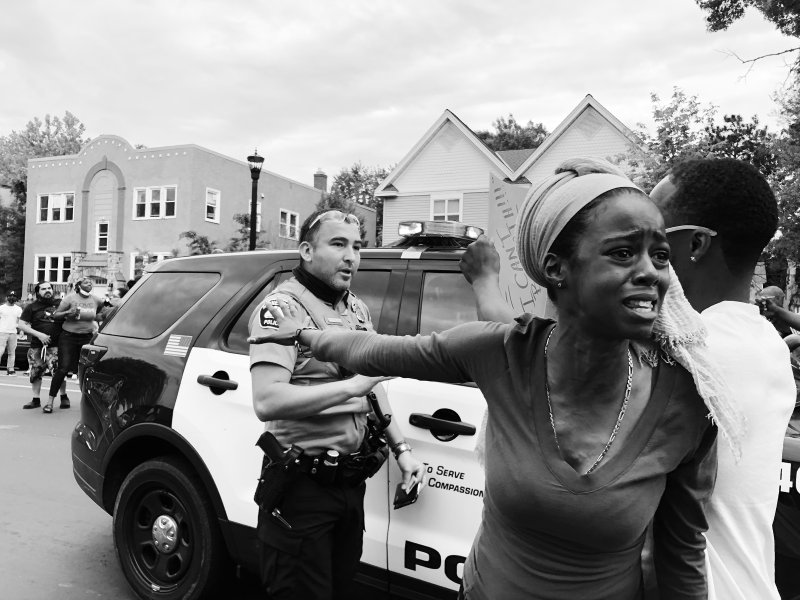
A Young Woman Outraged by the Death of George Floyd –
credit Patience Zalanga Time.com
While driving to the Black Lives Matter rally in Adelaide, I listened to Dr. Anne Pattel-Gray, an Aboriginal woman who is a descendant of the Bidjara/Kari Kari people in Queensland and is a recognized Aboriginal leader, as well as an expert on Black theology.
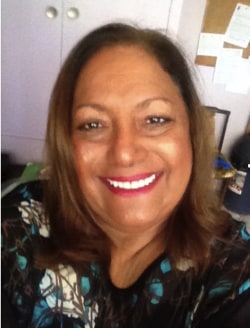
Anne Patel-Gray
credit Common Dreams 2009
Speaking on Radio National, she said:
“The one thing we need to do . . . is to bring justice to the forefront and dismantle the systematic, racist systems that allowed the subjugation and disenfranchisement of Aboriginal and Torres Strait Islander people. That’s what we need to do. We can’t change history, but by God, that history can inform our present and our future and make us look at a different path and create a different relationship for us Australians to live by. One where we’re respected, we’re embraced, we’re valued, and we have something significant to contribute to this country and where poverty is something of the past. . . . I’d like to see some truth telling. I’d like to see a Treaty. When we talk about . . . being transformative and changing how we work, both individually and structurally, then you’re talking about a Treaty because that’s the only way we get justice.”

Adelaide Protests Deaths in Custody
credit Jane Sloane
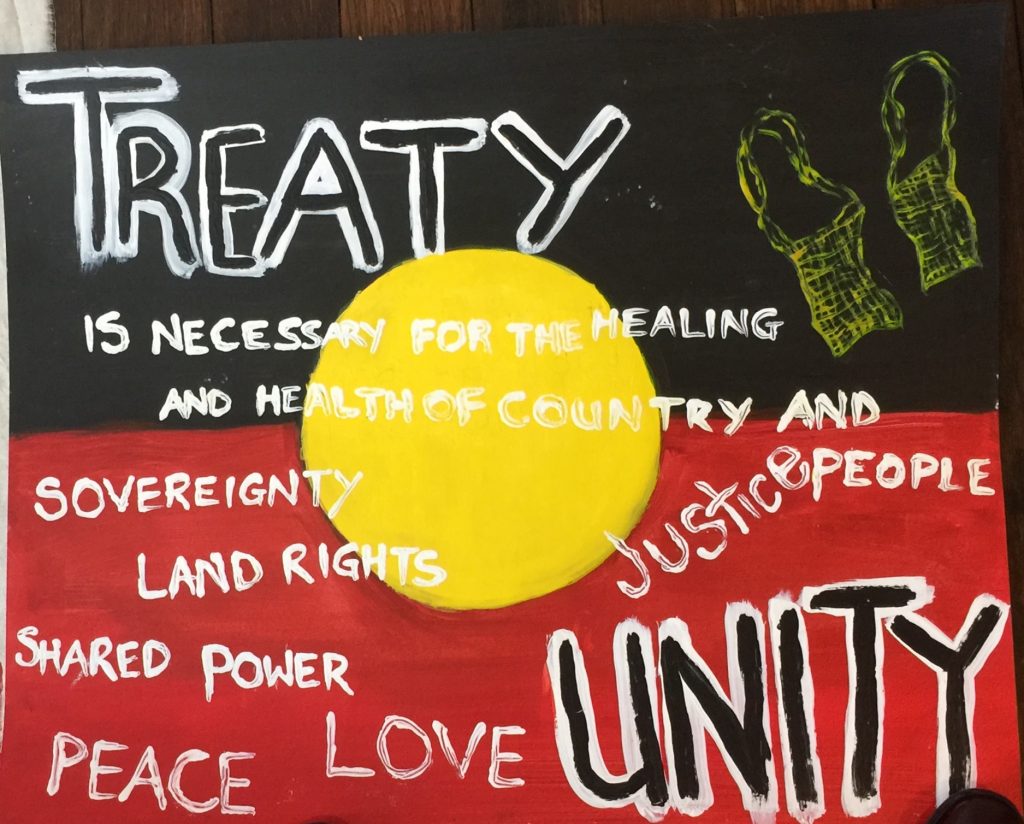
Treaty Poster
credit RedShoesWalking
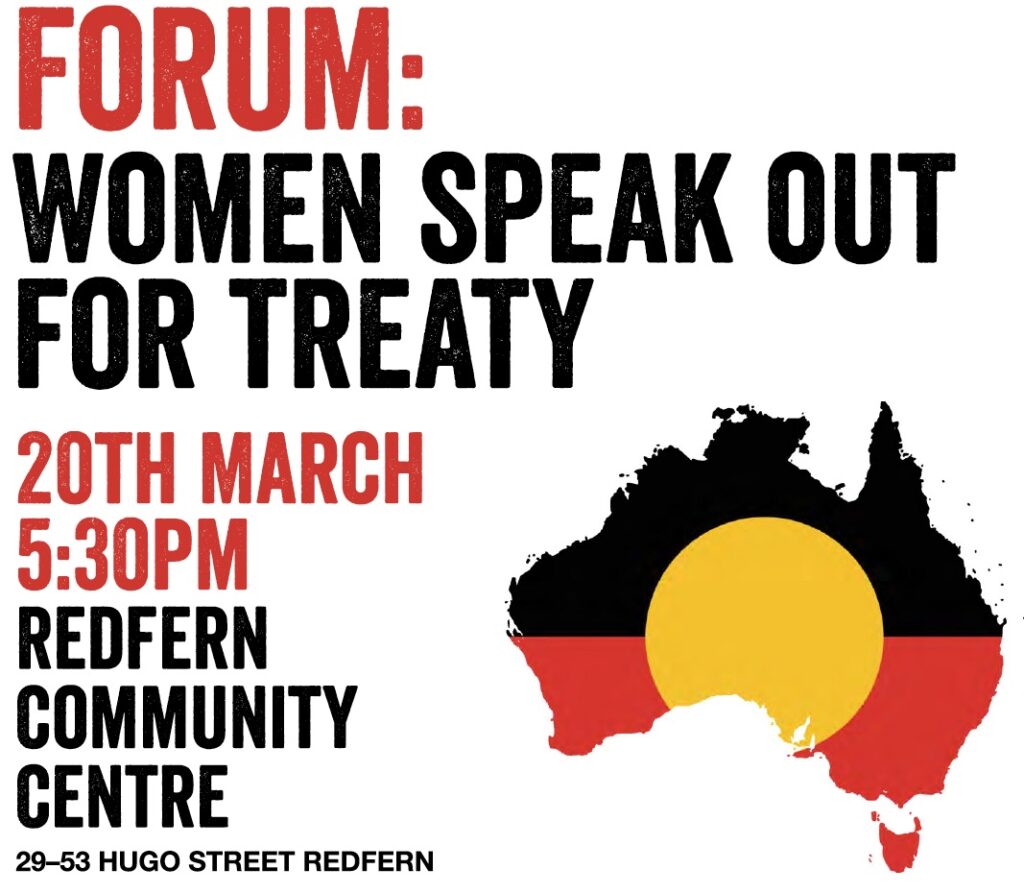
Women for Treaty
credit Workers’ Bush Telegraph
The hunger for racial justice is global:
Whether it’s migrant children in cages crying for their mothers, indigenous communities that suffer the highest rate of police violence nationally and systemic disregard for missing and murdered indigenous women, or the brutalizing effects of the criminal justice system on black communities—women of color, especially Black women, not only suffer the loss of children to police violence, they are also the targets of that violence—including Breonna Taylor, who was killed by police in her Louisville, Kentucky home back in March. Our humanity is dying from racism
For too long, Black people have been silenced and killed under the physical and mental violence of the carceral system—built by, and for, the preservation of a patriarchal, racist worldview. Each of us must act now to demand an end to this chapter in our history.
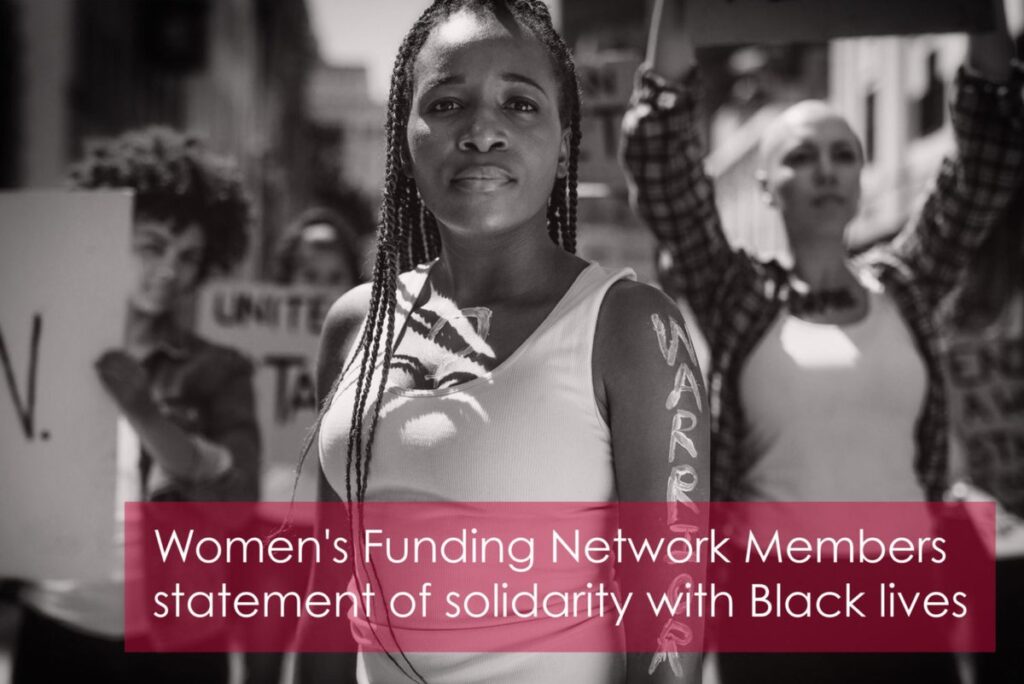
WFN Members Statement of Solidarity and Condemnation of Police Brutality
Women’s Funding NetworkWomen’s Funding Network
Today, amidst ongoing protests against police violence, spurred by the killing of George Floyd by Minneapolis police, members of the Women’s Funding Network, issued a statement of solidarity with Black communities and condemned police brutality and systemic racism.
It’s this “patriarchal, racist worldview” that weighs especially heavy on Black women right now. And it speaks to the importance of the #SayHerName social movement in raising awareness of black female victims of police brutality and anti-black violence in the United States. Women’s voices are crucial in advocating for racial, gender and climate justice (intrinsically linked) and in ensuring effective strategies and solutions to the multiple crises playing out across the globe.
Someone said to me a couple of weeks ago, “We can get to women’s voice and leadership later, but first let’s get through the emergency phase of COVID-19.” My furious response was that women’s voice and leadership is part of the emergency response. Women’s contributions save lives and ensure effective responses are in place to address the pandemic. They’re not a nice little extra.
We urge our colleagues in philanthropy to support organizations that are mobilizing to advance community-based solutions. Give generously to organizations on the frontline of change, including to your local women’s fund or foundation. Women’s funds are system change institutions that multiply every size gift 10x primarily by supporting women of color-led organizations that are mapping an inclusive economy built on racial and gender equity and justice.

#Black Lives Matter
credit Ad Age
Globally, women comprise at least 70 percent of health workers and social service workforce, and thus they are at high risk of infection. Women also undertake at least two and a half times as much unpaid care work at home as men.
This care burden has increased dramatically due to coronavirus. Also, the majority of women work in the informal economy, which is precarious at the best of times, and even more so during a pandemic, which profoundly impacts women’s livelihoods, and the health and wellbeing of their families.
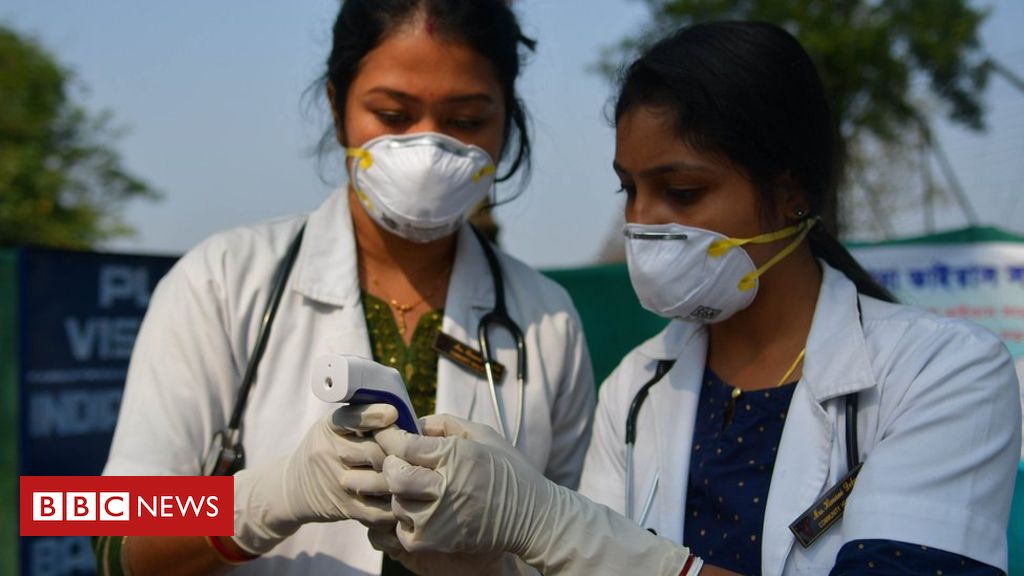
Indian doctors
credit BBC News
As we engage in discussions about recovery, and the kind of economies and societies we want to shape in the time ahead, ensuring women are a key part of decision-making will be vital to effective and inclusive strategies and solutions:
The only way to end the cycle of government violence against Black people is to act every single day. Use your voice. Use your vote. Use your money. As women’s funds, foundations, and gender justice funders—we stand with Black communities in the affirmation of Black lives, and vow to work with all who envision a world free from the institutions and violence perpetrated by racism and patriarchy.
During this COVID-19 lockdown, I’ve been on my own journey of exploring my voice and influence, including signing up for online singing lessons with Australian singer-songwriter Lucy Wise, who sent a message to her supporters to say that since she wasn’t able to go on tour during this time, she was offering online classes for those wanting to sing or learn an instrument. I wanted to sing.
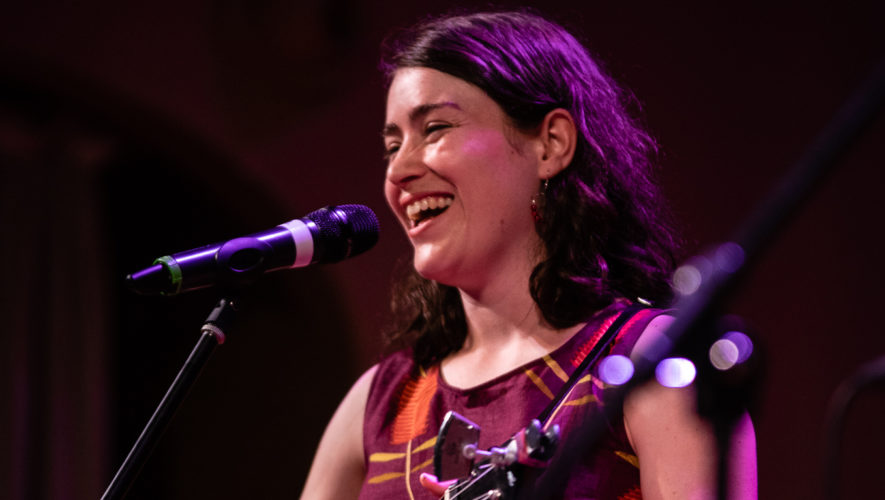
Lucy Wise
credit lucywise.com.au
It’s been a revelatory experience of opening my heart and lungs to sing at a time when we’re closing doors and borders. It feels like a metaphor for staying open to spirit, creativity, and nature. Singing songs of love, justice, and connection to the natural world, and feeling the energy zinging through my body has been life affirming. I sing with my lungs full at a time when my Dad is on oxygen 20 hours a day. I sing in the knowledge that my friend, Paul, almost died of coronavirus, and he’s still recovering. I sing as my friend’s daughter, Waniki, shares her experience of growing up Black in Australia. I sing loud while knowing that I’m in a position and place of privilege and that many, many women are silenced or silent due to circumstances, class, culture, gender, race, (dis)ability, and social norms.
Lucy encourages me to move my arms, my body, my legs. I take up space and use my full body for expression. Lucy mutes the microphone, and I sing big with her voice and mine intermingling. I imagine being on stage singing to a capacity audience: Oh, freedom, freedom, freedom is coming, oh, yes, I know. Oh, yes, I know, oh, yes, I know, freedom is coming, oh, yes, I know.
Instead—and infinitely precious to me—I’m singing to the sea in front of me. I can open the door and have the ocean air rush in while I sing up a storm. I improvise with my dancing and feel such freedom in my movement. I draw on the lessons from my friend Hallie’s online Qigong class and feel the chi rise as I dance and feel the power and beauty of my voice.

Singing to the sea
credit Jane Sloane
Later, Lucy introduces to me to the song ‘Dhungala’, by the late Australian singer-songwriter, Michael Kennedy where he sings with the many women and men of the Boite’s Melbourne Millennium Chorus so that we can sing it together. Dhungala is a word given to the Murray river by the Yorta-Yorta people. Having just read Margaret Simon’s searing investigative Quarterly Essay, Cry Me A River: The Tragedy of the Murray-Darling Basin, the song, ‘Dhungala’ is an urgent cry for the river’s survival. Listen and weep.
I keep singing. I join a Quaker singing group each week as we sing hymns and songs of resistance, joy, and justice. Frankie Armstrong, renowned for her teachings on voice, says “Singing is our birthright; recent research shows that our ancestors have been singing for at least fifty thousand years and that music is ‘hard-wired’ into us.”
And while it’s men who have been most visible in the history-telling of these movements for justice, there have been so many black and brown women who have used their art to speak, paint, dance, write, and sing us free.
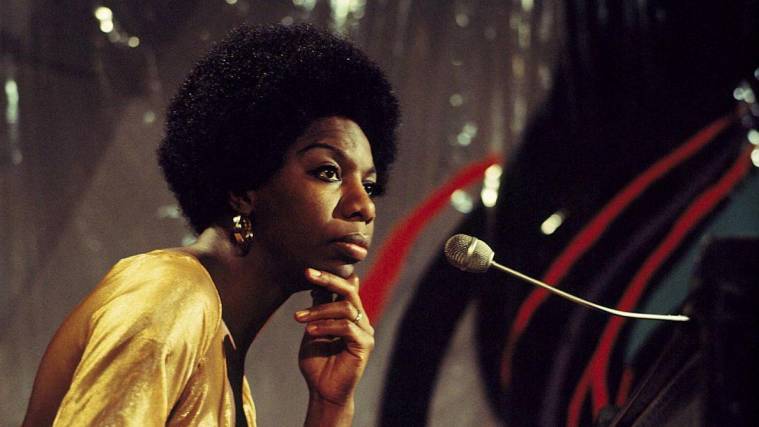
Nina Simone – Mississippi Goddam
credit Pan African Music
Nina Simone found her voice, as well as her purpose, in writing and singing music that became the soundtrack of the Civil Rights and Black Power movements. The first time she openly addressed the racial inequality that was prevalent in the United States was with the song “Mississippi Goddam,” her response to Medgar Evers’ murder and the 1963 bombing of the 16th Street Baptist Church in Birmingham, Alabama, that killed four young Black girls and partially blinded a fifth girl. Nina Simone remarked that the title and the song itself was like throwing “ten bullets” back at the bombers.
Mahalia Jackson’s singing was also essential to Civil Rights Movement, including the iconic anthem, “We Shall Overcome.” She said she hoped her singing would “break down the hate and fear that divide the white and black people in this country.”
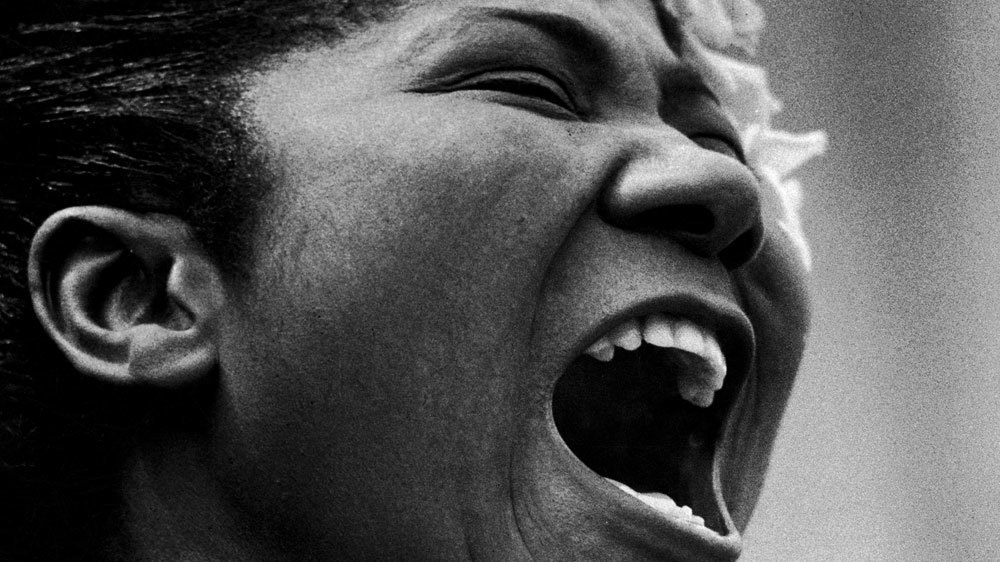
Mahalia Jackson
credit NPR
In 1988, Tracy Chapman released the song, “Talkin’ ’bout a Revolution.” The song caught hold across the world, including in Tunisia during its 2011 revolution, which was also sparked by women’s activism.
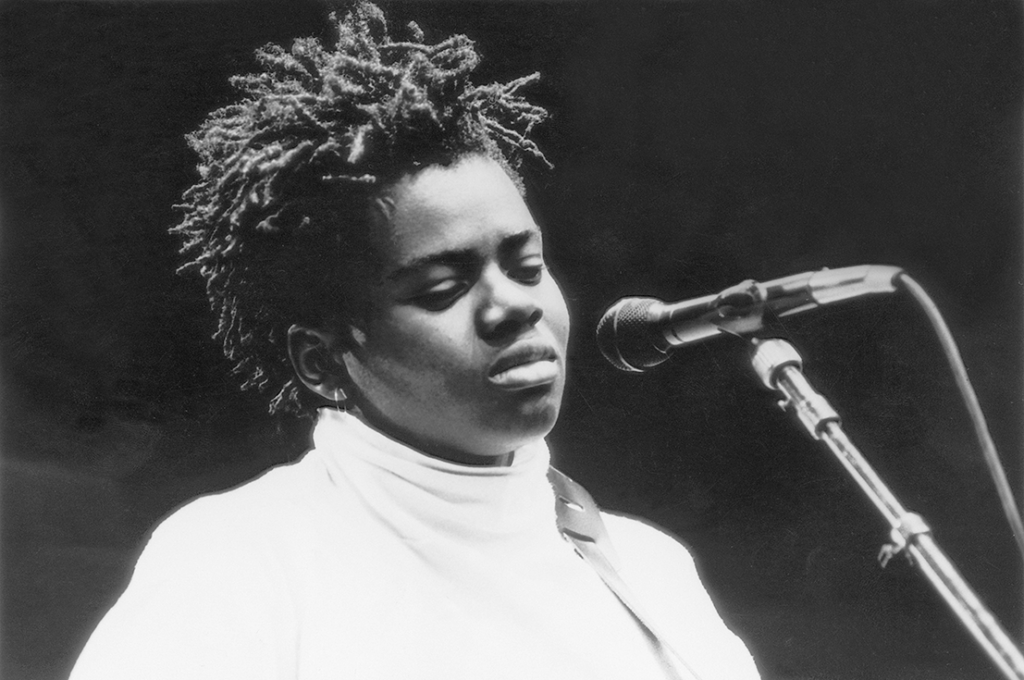
Tracey Chapman
credit Rolling Stone
Song has also been an empowering medium for Aboriginal female artists. I think of Tiddas, one of the first Aboriginal and Torres Strait Islander female groups to hit the charts in the 1990s, with songs confronting racism and incarceration in Australia.
Tiddas – sing about life CD cover
Tiddas – credit Alchetron
I think of those Aboriginal and Torres Strait Islander female artists who have used “counter-song,” as a form of witnessing and truth-telling to reframe and begin to heal from the violence against Aboriginal and Torres Strait Islander children. “The collective nature of song as testimony in Indigenous Australia further allows for the possibility of a counter-song to be performed not only by members of the Stolen Generations, but by others for them. Several of the songs . . . [were] composed by the children and grandchildren of children who were forcibly removed.”
Leah Purcell, Aboriginal actor, writer, and singer, wrote “Run, Daisy, Run,” which “sort of become the unofficial national anthem” for the Stolen Generation. The song was inspired by her grandmother’s forcible removal from her family:
She was taken when she was five, her and her sister and her little brother, and their dad was white, a Scotsman. He worked at the Forest Vale Homestead in Mitchell, but he lived in the Aboriginal camp, Murri Camp. The children were taken and he—someone ran across to tell him at work, but by that time, you know by the time he saddled a horse or whatever, they were all gone into town. When he got to the train station the children were in the cattle carts. The girls were in one and the boys were in the other.
In the song, an Aboriginal mother tells her daughter:
Run Daisy run, run Daisy run
They were the last words her mama had said
“Run to the highlands, run through the scrub,
Just run, run Daisy run, just run, just run
Because the whiteman he’s ridin’ high”
Purcell’s song rejects the government’s narrative about Aboriginal mothers willingly giving up their children.
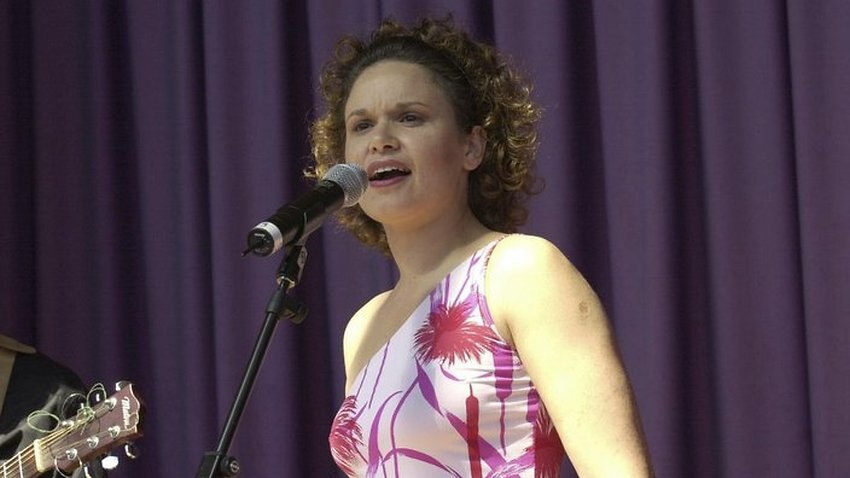
Leah Purcell
credit Patrick Riviere Getty Images
Singing itself has been an act of protest, activism, and transformation for generations. In a recent interview with Judy Collins, Andrew Ford asks Judy for her thoughts on the power of singing. She responds, “Most of us can sing. . . . The gathering—where we sing—whether it’s in church, in protests, or in performances of all kinds in the theater, it gives us this wonderful feeling. One of the reasons I always sing ‘Amazing Grace’ at the end of shows . . . is the way it makes people feel. They just are so transformed with joy when they open their mouths and start to sing. And that, that’s it. When you can sing, you have a kind of joy that’s indescribable. And it’s totally physical. Yes, it’s emotional too, but it comes from the fact that you’ve involved the entire use of your body, your breathing, your lungs, your chest, your eyes, your ears, everything is kind of put on alert when you’re singing, and it does change you.”
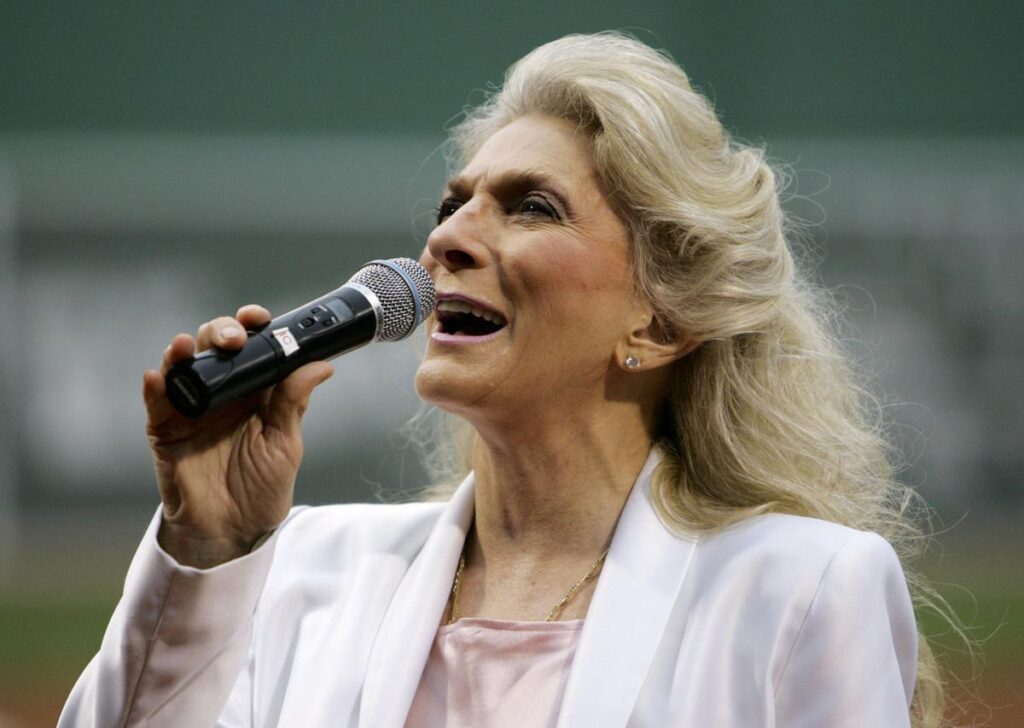
Judy Collins performing TSO benefit concert in April 2020
Credit Michael Dwyer, Arizona Daily Star
Collins then tells a story that underscores the role women, especially Black women, have played on the frontlines of movements for justice, through the power of lifting their voices as a conduit for rights and justice:
I was in Mississippi in 1964, and I spent some of the time with the summer of voter registration . . . to try to get African Americans to vote. . . And so I traveled for a few days with Fannie Lou Hamer. She used to get out of that car—and we were traveling in an integrated bus . . . she’d get out of the car, and I said to her, “Are you afraid?” and she said, “They’ve already tried to kill me in so many ways.” And we’d get out of the car, and she’d stomp up to the front door of a closed group of homes and she’d start singing, [Collins sings] “This little light of mine, I’m gonna let it shine.” And so people were terrified to go down and vote, but they’d come to the door, you’d see the curtains wiggling, they’d come out the door, and she would get them out on the street, she’d get them down to the voting polls.”
“One day I know the struggle will change. There’s got to be a change – not only for Mississippi, not only for people in the United States, but people all over the world.”
— Fannie Lou Hamer
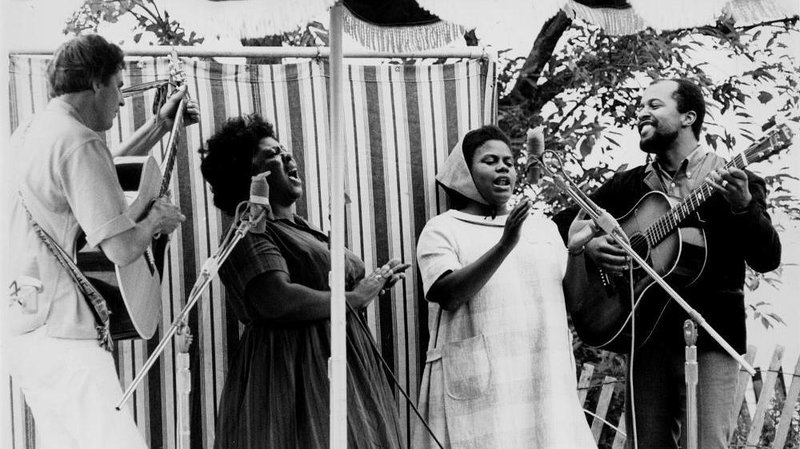
Fannie Lou Hamer singing with group
credit NPR
“You don’t have to like everybody, but you have to love everybody.”
— Fannie Lou Hamer
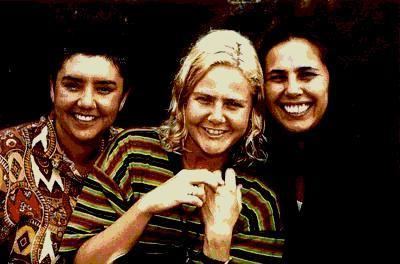
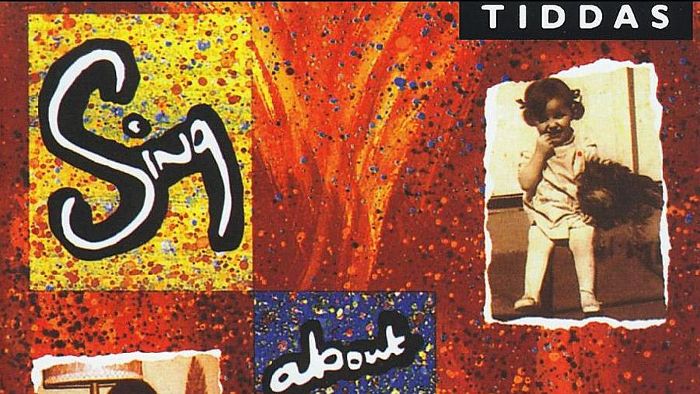
2 Responses
Hi Jane. I loved reading this heartfelt and informative essay seeped in social justice. Self transformation and systemic transformation at a time when the world needs to become its better self.
Thanks so much, Muadi. And of course you live this commitment in the way you work and move in the world. Your own powerful voice for justice and transformation has influenced me and so many in your orbit.